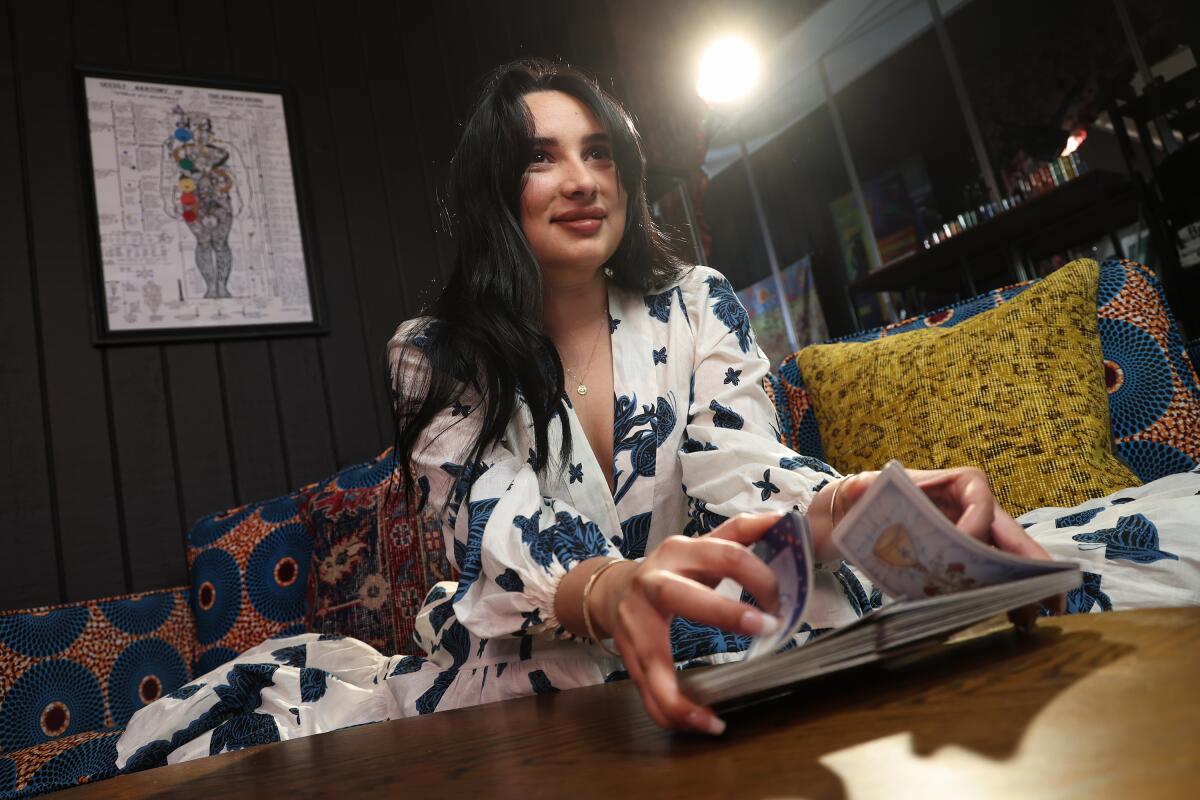Reporter’s notebook: Is a fortuneteller’s fate ‘Foretold’?

- Share via
The brightly colored neon signs are so ubiquitous, we hardly ever notice them. Psychic shops, with their glowing promises of past, present and future, make up the backdrop of daily life.
But what is life like behind the psychic shop door?
I was about to find out. It was October 2019, and I had just sat down at an Orange County cafe for my first conversation with Paulina Stevens. And there, over a couple cups of tea, her story came spilling out.
For me, it was the start of a 3½-year reporting journey. I would learn how to report in the insular and often misunderstood world of the Romani community. And though I was already aware of the power of entertainment and news media, her story would be a startling reminder of how media can shape perceptions of an entire people.
Stevens told me that she was raised in the psychic shops that dot California’s landscape. At 12 years old, she was taken out of school and raised to become a wife, mother and fortuneteller. This is what she knew — it was what all the women in her family had done.
At 17, Stevens married a boy from her community in a lavish, three-day wedding celebration that packed out the Hilton Hotel in Irvine. Her marriage began under her new in-laws’ roof — a psychic shop in Orange County. There, she continued to read fortunes, cook, clean and serve a steady stream of visiting family members.
Soon, Stevens became the mother of two girls, raising them in the same way she had been taught. By 20, Stevens had followed every step of her predetermined path.
But on one warm summer night in 2018, she decided to break away. Stevens sneaked out of the psychic shop with her two daughters — leaving everything she once knew and turning to the outside world.
A year later, she was telling me her story — and hoping publicity might help her keep her daughters in a nasty custody dispute.
“I was entering a custody battle alone, so no family support,” Stevens said. “I didn’t feel like anyone around me understood what I was going through, mentally and emotionally, because they didn’t grow up in my community and obviously didn’t have my cultural background.”
When we first met, I knew nothing about Romani culture. But once I started reporting this story, I couldn’t stop seeing tropes about Romani people everywhere. In literature, art and film, Romani people are stereotyped as exotic wanderers, mysterious fortunetellers and swindlers.
“All right, Gypsy, where’d you get that money?” demands Claude Frollo, the evil religious zealot in Disney’s animated film “The Hunchback of Notre Dame.”
“I earned it!” responds Esmeralda, the Romani main character, defiantly.
“Gypsies don’t earn money,” he sneers back.
Many Romani people use the word “Gypsy,” but it is generally considered a slur when outsiders say it. Historians say the word derives from when brown-skinned Romani people first migrated from India to Europe and predominately white Europeans mistakenly identified the newcomers as Egyptians. The word morphed into the word “gypped” — reducing an entire ethnic group to stealing.
Negative stereotypes about Romani people have become so commonplace that they appear in seemingly innocuous places — like at a Los Angeles bar, in a cocktail named “Gypsy Fever,” featuring something called “illegal mescal.”
“Racism toward Roma is the last acceptable form of racism,” wrote Melanie Covert in her book “American Roma.”
It is largely because of these tropes that Romani people — who make up an estimated population of 1 million in the United States — have typically hidden from public view. For their own protection, and to preserve their culture, Romani people usually keep outsiders at bay.
On the surface level, Stevens seemed to be serving me a story of the same stereotypes that have characterized her people for centuries. But Stevens and I kept talking long after we finished those cups of tea. For years, I’ve been following the story of Stevens and her people. I recall spending one of my birthdays with her family rather than mine. The story has taken me all over California, across the United States and even around the world, and the result is a multipart podcast, starting this week, called “Foretold.”
Digging past the stereotypes, I learned about a vibrant and resilient people who have endured centuries of being marginalized, persecuted and driven out.
Stevens’ decision to leave created a fissure with her family and community — and opened her up to a world of scrutiny. Although I was following one woman’s story in a niche corner of America, I began to grapple with questions that so many of us ask ourselves: What does it mean to preserve a culture? How can one be part of a larger culture but also stand out as an individual?
The answers, I would come to see, are not so simple, and they are not the same for everyone. Such are the lessons learned after listening to a young woman tell her story over a cup of tea.
More to Read
Sign up for Essential California
The most important California stories and recommendations in your inbox every morning.
You may occasionally receive promotional content from the Los Angeles Times.














